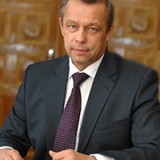UDC: 339.982
BBC: 65.9(2Рос)-56
Gerdo A.E.
The study of systemic biases in the assessment of the investment climate of the Russian Federation by international institutions in new geopolitical conditions
Keywords: investment climate, investment environment, foreign direct investment, international institutions, the World Bank
Escalation of geopolitical tension after the beginning of the Special Military Operation resulted in severance of many well-established economic ties between the Russian Federation and countries that are now considered "unfriendly". In particular, as a result of sanctions pressure and retaliatory counter-sanctions, the situation in the Russian Federation's foreign direct investment sector has changed, both in terms of partner countries and in terms of investment environment elements. The assessment of Russia's investment climate by a number of international institutions not only underwent a significant negative change during the period of economic and political uncertainty in early 2022, but also failed to improve against the backdrop of actual growth in the Russian economy in subsequent periods. At the same time, the investment rating is one of the main factors in initiating capital inflows into the national economy, which increases the relevance of the topic under study after the geo-economic shifts that have occurred. The purpose of the study is to identify signs of a structural underestimation of investment climate factors in the Russian Federation by a number of international organizations, such as the World Bank and the Big Three global rating agencies, both before 2022 and after the start of the SMO, amid escalating geopolitical tensions between Russia and "unfriendly countries." Materials and methods. The materials for the study were estimates of the components of Russia's investment climate, calculated and published by international organizations based on their own methodologies, as well as statistical data on Russia's macroeconomic indicators provided by the World Bank. The study used regression analysis, and the author of the article presented a formula based on the World Bank methodology that allows a number of separately calculated indicators to be combined and their values be converted into a composite index. In addition, general scientific research methods such as analysis and synthesis, as well as methods of induction and deduction were used in the course of the work. Results. The article presents a segmentation of investment attractiveness factors into "economic" and "political" components with a further assessment of the relationship between these two components by regression analysis. The results obtained also reflect the conjuncture of the area under study until 2022, demonstrating structural underestimation of certain factors in Russia's investment climate that existed even before the start of the Special Military Operation. The results of the conducted research suggest that it is possible to judge on identifying the signs of a structural underestimation of Russia's investment climate by international institutions, both before 2022 and after the start of the Special Military Operation. Conclusions. The values of a number of analyzed macroeconomic indicators of the Russian Federation, which are both economic factors of the investment climate, were characterized by growth either in 2022, in 2023, or in both periods. At the same time, assessments of Russia's investment climate by the Big Three international rating agencies and the World Bank were relatively low both prior to the start of the SMO, underwent a significant negative change after 2022. Inconsistency between the above-mentioned "economic" and "political"’ factors of the investment climate can be explained by actual absence of a noticeable correlation between the two groups of parameters, which, in turn, was established through regression analysis.
References
- Zaitsev Yu.K. Investitsionnyi klimat [Investment Climate]. Moscow, Yurait Publ., 2025, 123 p.
- Eskindarov M.A., Zvonova E.A., Antropov V.V. et al. Mezhdunarodnyi finansovyi rynok [Global Finance Market]. Moscow, Yurait Publ, 2025, 430 p.
- Perekhod S.A., Mkhitaryan A.V., Selifonkina D.S. Mezhdunarodnye sanktsii protiv Rossii (2014–2024 gg.): otsenka i posledstviya dlya finansovogo rynka [International Sanctions Against Russia (2014–2024): Assessment and Implications for the Financial Market]. Vestnik Instituta ekonomiki Rossiiskoi akademii nauk, 2024, no. 4, pp. 116–138.
- Kovalev V.V., Dyukina T.O., Zuga E.I. et al. Teoriya statistiki s elementami ekonometriki [Theory of Statistics with Elements of Econometrics]. Moscow, Yurait Publ., 2025, 672 p.
- Kaufmann D., Kraay A., Mastruzzi M. The Worldwide Governance Indicators: Methodol-ogy and Analytical Issues (September 2010). World Bank Policy Research Working Paper No. 5430, Available at SSRN: https://ssrn.com/abstract=1682130.
- United Nations Department of Economic and Social Affairs (UN DESA). LDC Data. Least Developed Countries. Available at: https://policy.desa.un.org/themes/least-developed-countries-category/ldc-data.
- World Bank. Russian Federation – Data. Available at: https://data.worldbank.org/country/russian-federation.
- World Bank. Worldwide Governance Indicators. Available at: https://www.worldbank.org/en/publication/worldwide-governance-indicators.
About authors
- Gerdo Andrei E.
- Post-Graduate Student, Department of Economic Theory and International Economic Relations, Chuvash State University, Russia, Cheboksary (222andr@mail.ru; )
Article link
Gerdo A.E. The study of systemic biases in the assessment of the investment climate of the Russian Federation by international institutions in new geopolitical conditions [Electronic resource] // Oeconomia et Jus. – 2025. – №3. P. 18-29. – URL: https://oecomia-et-jus.ru/en/single/2025/3/2/. DOI: 10.47026/2499-9636-2025-3-18-29.

